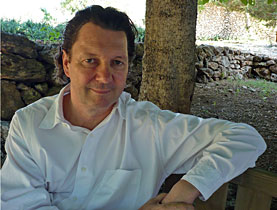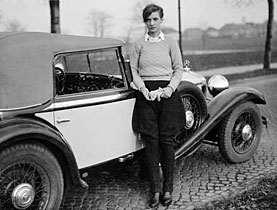“I find inspiration through writing”

Martin Suter, Switzerland's most popular living writer, has over the past ten years written numerous bestsellers and achieved international success.
He tells swissinfo his inspiration comes from the act of writing. What motivates him is not so much producing the work which will define him as making each book better than the last.
Suter divides his time between Guatemala and Ibiza where he tends to his Mediterranean orchard, growing almonds, figs, oranges, olives and grapes. He produces about 600 litres of wine and 200 litres of olive oil each year.
Despite living abroad, he says he still has a good relationship with Switzerland, where all his books are set.
swissinfo: Why did you make Ibiza your home?
Martin Suter.: I first came here in 1975 to visit my friend [Swiss writer and painter] Jean Willi.
It took me a while to realise how beautiful it is here. It was 1985 and my wife and I rented a car to drive through the countryside. We decided to buy a property and found an apartment in the old town of Eivissa in 1988. We renovated it and began to live here various months of the year. I even took a year out to live on the island and write my first [unpublished] novel.
But Margrith and I realised in 1991 that it is rather cold and humid in the winter with little sun in the old town. We visited friends in Guatemala and found the climate there ideal; like springtime. So now we spend our winters in Guatemala and the rest of the year in our house in the Ibiza countryside with some trips to Switzerland.
swissinfo: Why don’t you live in Switzerland?
M.S.: I have a good relationship with my country of origin. My roots are in Switzerland and my novels are all based there because it is what I know best. But distance helps your memory process things. A filter of spatial and temporal distance helps my writing.
swissinfo: Where do you write best, Ibiza or Guatemala?
M.S.: If I am working on a novel I do better in Guatemala because there is less distraction. In Ibiza there is the farming that always provides work and I do the cooking here. This is very time consuming because just going shopping takes half a day.
I do a lot of editing here though and tend to write about two to three hours every day. In Guatemala I am at my desk at 9am and write for 8 hours. I have a cook there.
It’s also hard in Ibiza because it is so beautiful. I can’t sit under a fig tree and write. I can do concepts and discuss things but it’s hard to write in a concentrated manner here.
swissinfo: Where does your inspiration come from?
M.S.: The ideas don’t just appear out of nowhere. I have to sit down and work.
I find inspiration by actually writing. I do some basic research beforehand but most of the detailed research I do parallel to writing a novel. Too much research before starting can paralyze you.
swissinfo: Are there any English-speaking authors you admire?
M.S.: I am big admirer of the anglo-saxon approach to novel writing because it is all about story telling. In German literature this was long frowned upon as old-fashioned. German authors were supposed to write from the belly and not think about the reader. But Anglo-Saxon writers admit that they consider the reader and think about structure and plot in order to tell a story.
I am a big fan of Somerset Maugham. He is a wonderful storyteller and I also like what he writes about writing. I discovered him aged 16 when a British neighbour lent me his autobiography. I read a lot of British authors when I was younger.
I also admire Ian McEwan – who shares my publisher. Other favourites are William Boyd and the crime and script writer Elmore Leonard, who will be 80 soon.
swissinfo: Do you think your novels get better as you get older?
M.S.: I’m not aiming to produce the work of my life or seeking immortality but an important motivation is that I would like the next book to be better than the previous one. If a novel is as good as the last one that’s alright, but if it’s better then that’s great motivation.
swissinfo: You are the most popular living Swiss author, what is the secret of your success?
M.S.: I suppose that lots of people read my books. I’m lucky that they like similar things. I call my novels ‘stories with a secret’. I construct the plot line carefully beforehand and plan what is going to happen.
In the last novel [The Last Weynfeldt] there were many different narrative strands. For this to work the story line has to be well constructed. It’s terrible when an author improvises and you can really tell.
swissinfo: What are you currently working on?
M.S.: I am working together with [Swiss singer/songwriter] Stephan Eicher on a musical project. In the autumn I will start my new novel. I already know what it’s about and will start writing here in Ibiza but I prefer not to reveal anything yet.
swissinfo: You recently became a father (Martin Suter and his wife adopted twins from Guatemala). How has this changed your life and your work?
M.S.: It is extremely exciting, touching, and turns your reality upside down. At 6.30pm I always stop what I’m doing and devote time to my children.
But being a father makes writing more difficult. Often I’m more interested in what they’re doing than what the novel I’m working on is doing.
swissinfo-interview: Claudia Spahr in Ibiza
The author, columnist and script writer Martin Suter was born in 1948 in Zurich, Switzerland.
Until 1991 he worked as an advertising executive and creative director before becoming known for his weekly column “Business Class” in the “Weltwoche newspaper.”
In 1997 Suter’s first novel “Small World” was published and he has since released five more novels, for which he achieved international acclaim and various awards, including the Friedrich-Glauser Preis in 2007 for “A Deal with the Devil”.
He lives with his family in Ibiza, Spain and Guatemala.
Small World, novel, 1997
Beresina oder Die letzten Tage der Schweiz (“Beresina, or the Last Days of Switzerland”, directed by Daniel Schmid), screenplay, 1999
Business Class, collected columns, 2000
Die dunkle Seite des Mondes (“The Dark Side of the Moon”), novel, 2000
Ein perfekter Freund (“A Perfect Friend”), novel, 2002
Lila, Lila (“Violet, Violet”), novel, 2004
Huber spannt aus (“Huber relaxes”), collected columns, 2005
Der Teufel von Mailand (“A Deal with the Devil”), novel, 2006
Der letzte Weynfeldt (“The Last Weynfeldt”), novel, 2008

In compliance with the JTI standards
More: SWI swissinfo.ch certified by the Journalism Trust Initiative

You can find an overview of ongoing debates with our journalists here. Please join us!
If you want to start a conversation about a topic raised in this article or want to report factual errors, email us at english@swissinfo.ch.